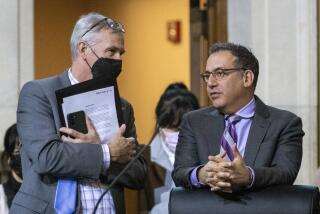Council Acrimony Will Linger in Wake of Walkout
- Share via
The old saying about how you can’t choose your relatives also applies to the members of the Los Angeles City Council.
The 15 lawmakers come from distinct backgrounds and communities and are forced by the will of the voters to work side by side as the city’s top legislative body.
But sometimes they don’t work together--as was the case last week when seven members stormed out of the council chambers during a heated debate over a proposed new set of sewer rates.
It was the first time in recent memory that a group protest had broken a quorum. Resentment created by the walkout spilled over into Tuesday’s vote on the measure and council members say the animosity won’t soon be forgotten.
“I think there will be some personal repercussions in the sense that some people who work close will no longer do that,” said Councilwoman Jackie Goldberg, who opposed the new fees and participated in the walkout. “But I don’t think that it will last.”
Councilman Hal Bernson, who supported the fees and was visibly upset by the protest, agreed. “‘The resentment will linger but it will eventually go away.”
On Wednesday, the council met as usual, showing no visible signs that the tension had affected its daily routine.
But City Hall insiders predicted that some council members will make a mental note of the incident and use it as ammunition against a colleague during a future debate.
“This isn’t just going to be forgotten and roll off of anyone’s shoulders,” said one council aide.
The seven members--who represented parts of the inner city--walked out on Friday just seconds before they were expected to be on the losing end of a vote to adopt a rate system that will increase fees for many of their constituents.
The remaining council members who supported the new fees represented San Fernando Valley and Westside constituents who would get lower sewer fees under the new changes.
The protesting members said they walked out because they felt that council President John Ferraro and the measure’s supporters didn’t give opponents enough time to testify against it.
The council ultimately voted 8 to 6 on Tuesday to adopt the new sewer rates, but not before they took even more shots at each other over the protest.
“It’s good to see you all back,” Councilman Richard Alarcon sarcastically told the council members who had walked out.
Angry exchanges among the council’s geographical factions are nothing new for the panel. Since the 1994 Northridge earthquake, council members from the Valley and the inner city have clashed repeatedly over how to disperse millions of dollars in federal emergency funding.
Last year, Valley council members won a hard-fought battle to adopt a new set of water rates that benefited Valley constituents at the expense of other parts of the city.
Longtime observers say that the lingering resentment over those clashes and election-year pressures to court voters were all at play during the protest.
But some council members downplayed the incident, saying such conflicts are all part of the rough-and-tumble world of local politics.
“Politics is a strange animal,” said Ferraro, a 30-year council veteran. “I was told when I first came on the council, ‘Don’t let the anger against someone linger because on the next issue you may be on the same side with them.’ ”
In fact, he said that after last week’s walkout, several of the council members who participated in the protest called him to smooth things out.
“What’s done is done,” he said. “We still have to work together.”
Councilwoman Laura Chick, who spearheaded the new sewer rates and later lashed out at the protesters, said she has already begun to work on a police project with Goldberg.
“We are here on a daily basis with a full range of complicated issues and we don’t have the luxury of ill will toward each other,” she said.
But Alarcon said he also fears that friction from the protest may carry over into other decisions, particularly if they involved dividing up city resources.
“I fear that it will [happen again] but I hope not,” he said.
More to Read
Sign up for Essential California
The most important California stories and recommendations in your inbox every morning.
You may occasionally receive promotional content from the Los Angeles Times.











